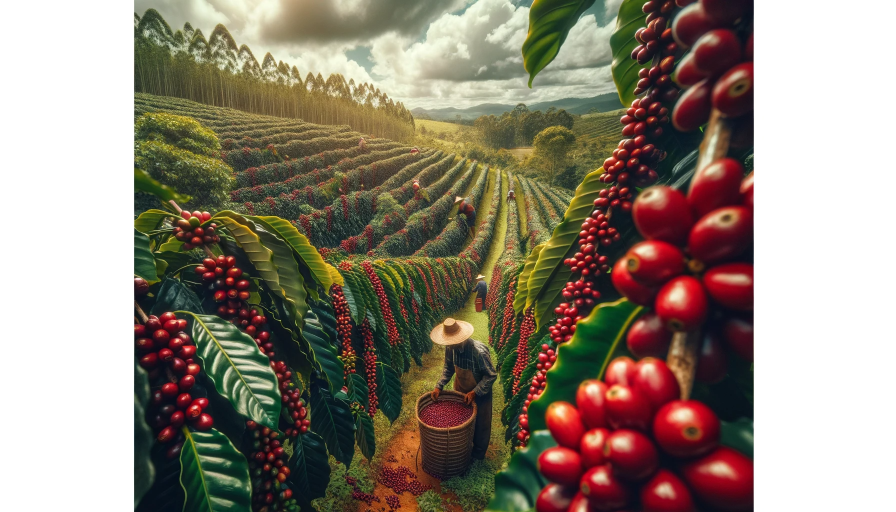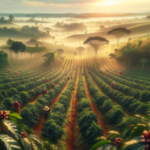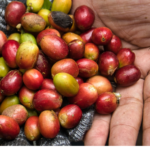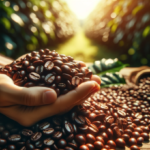Brazil is a big deal when it comes to coffee. This country is the top producer of coffee beans in the whole world, making about 60% of all the beans we use for our morning cups. Brazilian Arabica coffee stands out because it’s not too sour and has a sweet, nutty flavor.
Plus, farmers there like to dry the beans in a special way that makes them even tastier.
Places like Minas Gerais and São Paulo are where many of these amazing beans come from. Each spot gives the coffee its own special taste. Brazil isn’t just about any coffee; they’re working hard to make really fancy kinds known as specialty coffees.
You might have heard of Bourbon or Typica – these are some types the farmers grow. They pick most of their crop between May and September but also grab some more from October to January.
And guess what? When people make espresso, they often use lots of Brazilian beans because they mix well with others and don’t cost too much.
Now let’s talk about why Brazilian Arabica coffee has friends around the world lining up for a sip!
Key Takeaways
- Brazilian Arabica coffee is known for its smooth taste with chocolate and nutty notes, and it’s less acidic.
- Brazil is the world’s largest producer of coffee, exporting millions of bags each year.
- The beans are grown in special regions like Minas Gerais and São Paulo, which have the right conditions for Arabica.
- There are many types of Brazilian Arabica beans, each with unique flavors because of Brazil’s different soils and climates.
- This coffee type has won awards at competitions, showing its high quality. It is becoming more popular in the specialty coffee market.
Intriguing fact or statistic about Brazilian coffee production
Brazil stands tall as the number one coffee power in the world. Around 60% of all the coffee beans used come from Brazil’s farms. Every year, these farms send out 40 to 60 million bags of coffee across the globe.
Back in the 1920s, Brazil’s grip on coffee was even stronger. They had control over a whopping 80% of all coffee being made then! This shows just how big a deal Brazilian Arabica Coffee is and why it’s famous far and wide.
Background on Brazil’s Role as a Leading Arabica Coffee Producer
Brazil stands tall as the top coffee growing nation in the world. The story of Brazilian coffee began in 1727 when its first coffee bush took root. This marked the start of a rich history that would see the country dominate global production.
With over 6.6 billion pounds produced in 2015, its role is central to the worldwide coffee trade.
Coffee farms spread across vast regions like Minas Gerais and São Paulo work tirelessly harvesting Arabica beans known for their deep flavor profiles. These areas offer perfect conditions for coffee plants with their high altitude and rich soil, contributing to Brazil’s reputation in the industry.
In recent times, steps have been taken to boost Brazil’s image even further by focusing on specialty coffees. Government efforts aim to shift from just quantity to also highlight quality, showing the world that Brazilian Arabica isn’t only abundant but also exquisite and diverse.
Thesis Statement: Overview of what the post will cover about Brazilian Arabica coffee
We will talk about Brazilian Arabica coffee, the famous bean loved by many. You can also get to our guide to specialty coffee varieties to lean about a wide diversity of coffee beans used to produce vastly different tastes, textures and aromas. This post goes into how Brazil grows these beans and why they taste so good. We’ll look at where in Brazil they grow this coffee – places like Minas Gerais and São Paulo.
You’ll learn what makes its flavor special, with chocolate and nutty notes, and why it has less acidity.
You’ll also find out about different kinds of Arabica coffee from Brazil. The post will share how these beans are becoming more popular in fancy coffee markets. Plus, you will get tips on where to buy them and which brands are top-notch.
Finally, we discuss how growing coffee helps Brazilian people make money and connect with each other deepening the cultural impact of this amazing bean!
Understanding Arabica Coffee
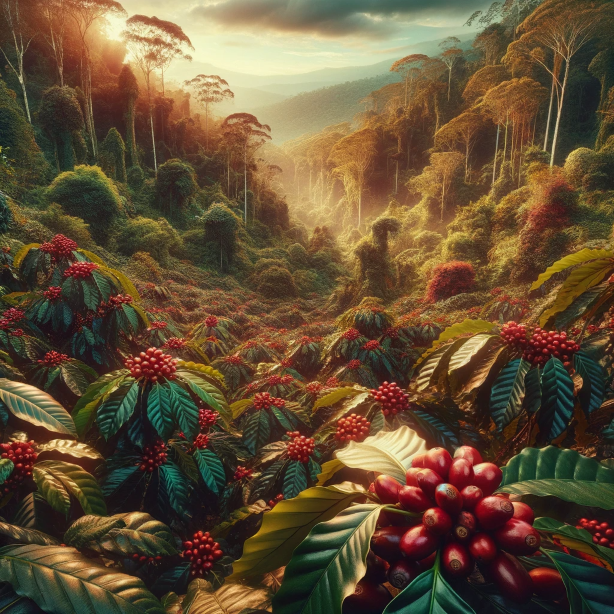
Delve into the world of Coffea arabica, a species celebrated for its superior quality and delightful complexity, setting the gold standard for gourmet coffee experiences. Discover why these cherished beans, thriving at lofty altitudes, are sought after by connoisseurs and casual drinkers alike.
Definition and Significance of Coffea arabica
Coffea arabica is a type of coffee plant that gives us high-quality beans. Its beans taste better and smell nicer than others, like Robusta. People all over the world want Arabica coffee because it makes up 60-70% of all the coffee we drink.
These plants need cool places in the mountains to grow well. They also get sick more easily than other types of coffee plants. But, their mild acidity and many different flavors make them very special for our morning cups of coffee.
Key Characteristics: Sweeter, More Acidic Taste, High Altitude Growth
This coffee grows well high above sea level. The average height is around 1,100 meters. This is where the air is cooler and wetter. Coffee plants like it there because they get to grow slowly.
This helps make the flavors in the beans stronger.
The beans from these heights have a sweet taste with more acid than others. These tastes come together to give a nice flavor that many people enjoy. It’s like how different soils and weather change how food grows, which changes how it tastes too.
High up in Brazil, farmers pick coffee by hand when it’s just right. They take care of their crops so we can have great tasting coffee every time.
Arabica Coffee Production in Brazil

Brazil stands as a quiet giant in the world of coffee, with its sprawling plantations nurturing some of the finest Arabica beans that grace cups across the globe. Dive into an exploration of Brazil’s commitment to this cherished crop, where tradition blends with innovative practices to yield a brew that resonates with coffee aficionados everywhere.
Major Growing Regions: Minas Gerais, São Paulo, Paraná, Rio de Janeiro
Brazil’s Arabica coffee grows in some special places. These regions have the perfect conditions to make coffee beans that taste great.
- Minas Gerais: This area is the king of coffee in Brazil. Lots of farms here grow Arabica beans because the land and weather are just right. The hills are high, around 1,100 meters, which helps the beans have a good flavor.
- São Paulo: Known for quality, São Paulo has coffee farms that work hard to make their beans taste amazing. They pick the beans by hand and take care of them from seed to cup.
- Paraná: This region might not be as big as others, but it still plays a big part. The farmers here know lots about coffee and use cool ways to dry and process their beans.
- Rio de Janeiro: Though smaller in production, Rio stands out with its unique coffee tastes. Here, the warm sun and rich soil add special notes to the Arabica coffee grown.
Influence of Terroir on Flavor
The soil, climate, and landscape of a coffee region shape the taste of its beans. This is called terroir. In Brazil’s major growing areas like Minas Gerais and São Paulo, the land and weather give Brazilian Arabica coffee unique flavors.
Brazil does not have very high mountains for growing coffee. So, Brazilian green coffee beans grow at lower heights than many other countries’ coffees. Because of this, they might not be as strong in flavor as beans from higher places.
Still, each part of Brazil adds different tastes to the coffee. For example, beans from Minas Gerais can taste sweet and nutty because of its soil and climate. All these things together make up the terroir and change how your coffee tastes.
Coffee Processing Methods: Natural/Dry, Washed
Brazil’s unique land gives its coffee a special taste. How farmers process the beans really matters too.
- Farmers in Brazil use two main ways to get coffee beans ready.
- One way is natural or dry processing. Here, they spread out the whole cherry and let it dry in the sun.
- This method takes time – up to four weeks! During this time, the cherry dries out and the bean inside gets a sweet flavor.
- Because of the sun, these beans can taste like fruit or nuts. They also have less acid than other types.
- The second way is washed processing. With this, they clean off the fruit from around the beans.
- After cleaning, they soak the beans in water. This helps get rid of any leftover bits of cherry.
- Washed beans have a cleaner taste because all the fruit gets washed away.
- Bourbon Santos is a famous kind of washed coffee from Brazil. It’s known for being really good quality.
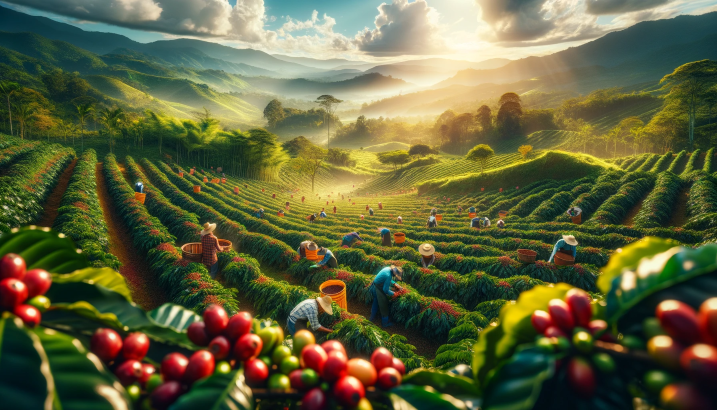
Main Harvest Seasons and Practices
Coffee farms in Brazil get busy from May to September. This is the main time for picking coffee beans. Workers go through the fields by hand, choosing only ripe cherries. They have learned how to do this fast and well.
The way they pick by hand helps make sure only the best beans are chosen.
After collecting, farmers dry the beans in the sun. They spread them out on large surfaces called patios or use drying machines if it’s raining. Drying is a key step that shapes the taste of Brazilian Arabica coffee.
There’s also a smaller harvest between October and January. Farmers follow these same steps then too. With care at every stage, from picking to drying, Brazil makes great quality Arabica coffee that people love all over the world.
Unique Qualities of Brazilian Arabica Coffee
Brazilian Arabica coffee stands out for its remarkably smooth and versatile flavor, enticing drinkers to explore the depths of its unique chocolate and nutty notes in each cup.
Flavor Profile: Chocolate, Nutty Notes, Less Acidity
Brazilian Arabica coffee stands out with a smooth taste that often includes rich chocolate and warm nutty notes. This type of coffee is less acidic, which makes it gentle on the stomach.
Many people enjoy this flavor because it’s sweet but not too sharp. The beans are dry processed, adding to their unique aroma and taste.
The sweetness and lower acidity come from being grown at lower elevations in Brazil’s vast landscapes. Next up, let’s explore how this affects the balance of sweetness and the overall body of Brazilian Arabica coffee.
Balance of Sweetness and Smooth Body
Brazilian Arabica coffee stands out for its sweet and creamy feel. This kind of coffee slides over your tongue and leaves a taste that is both sweet like sugar and rich like nuts. People love this balance because it makes the coffee easy to drink.
It’s smooth, not sharp or too bitter.
The Cerrado region in Brazil grows Arabica beans known for their smooth, sweet flavor with a hint of nuts. These beans are often used in espresso blends because they mix well and make the drink velvety.
The way farmers dry these beans without water helps keep the sweetness inside.
Next up is how the land itself adds to the many tastes you find in Brazilian coffees.
The Diversity of Varieties in Brazilian Arabica
Brazilian Arabica coffee boasts a tapestry of unique varieties, each with its own distinctive flavor and aroma that contribute to the rich diversity of Brazil’s coffee portfolio. Explore more to discover how these varied beans shape the taste and experience of your morning cup.
Overview of Common Varieties
Coffee lovers find many types of Arabica beans in Brazil. The country grows Bourbon, Typica, Caturra, Catuai, Acaia, Mundo Novo, and Icatu varieties. Each kind has its own special taste and features.
Some may be sweet or fruity while others are smooth and chocolatey.
Farmers pick these different beans across 14 regions in seven states. This variety means there’s a Brazilian coffee for everyone’s liking. Next up is how this diversity plays a role in the specialty coffee market.
Unique Traits and Qualities
Just as the various regions give Brazilian coffee its distinctive tastes, the unique traits of these beans add to their appeal. Each variety grown in Brazil has special qualities. For example, Bourbon and Typica beans offer complex flavors with a hint of sweetness often sought after by coffee lovers.
Some have chocolate or nutty notes that make them stand out from other varieties around the world.
Brazil’s natural processing method also creates a signature quality for its Arabica beans. This technique highlights the bean’s own sugars and flavor nuances, leading to a smooth and rich taste when brewed.
Farmers carefully select ripe cherries and dry them under the sun, which results in full-bodied coffees with less acidity compared to washed coffees from other countries. These methods earned Brazilian Arabica coffee fame for both traditional brews and specialty markets worldwide.
Brazilian Arabica in the Specialty Coffee Market
Brazilian Arabica has carved out a prestigious niche in the specialty coffee market, where its unique characteristics and exceptional quality have earned it a revered spot among connoisseurs and casual drinkers alike—discover the story behind its rise to prominence.
Recognition in Competitions
Coffee competitions show how good Brazilian Arabica coffee is. In these events, experts taste and rate different coffees. They look for the best flavors, smells, and quality. Many times, Brazilian Arabica wins awards.
This proves it stands out in a world full of coffee.
These wins help more people know about Brazil’s special coffee. Growers feel proud when their beans win. It also helps them sell their coffee for higher prices. Fans of good coffee start to look for Brazilian Arabica because they hear about these awards.
Coffee contests push farmers to keep making better coffee too. They learn from each win and try new ways to make their beans even tastier. This makes sure that Brazilian Arabica stays famous all over the world.
Demand for Single-Origin Brazilian Coffee
People around the world love Brazilian coffee for its unique taste. Single-origin Brazilian coffee is becoming more popular. This means the beans come from one place in Brazil, not mixed with beans from other places. If you are interested in knowing more about it, why not check out our article on single origin coffee
Coffee lovers can enjoy special flavors that come only from Brazil’s lands.
Brazil wants to be known for high-quality specialty coffee. They are working hard to show everyone how good their single-origin coffees are. Now, more cafes and roasters choose these special beans to offer something different and delicious. Find out what sets specialty coffee apart from normal coffee
Next, let’s look at how price affects the quality of Brazilian Arabica coffee in the market.
Pricing and Quality
Brazilian Arabica coffee comes at a good price. This makes it easy for more people to enjoy its taste. Lots of coffee blends use these beans because they are not too costly. Also, Brazil is working to make better specialty coffees.
These special beans show high quality in how they taste and smell.
The beans have a sweet nutty flavor with less acid. They often get dried out without water which adds to their unique taste. Now, Brazil wants the world to know about its fancy coffee types.
That means they want everyone to think of their coffee as one of the best you can buy.
Top Brands and Buying Brazilian Arabica Coffee
Discover the elite players in Brazilian Arabica coffee, showcasing brands that have made a mark globally with their exceptional quality. Explore avenues to procure these esteemed beans, whether through sophisticated online platforms or discerning specialty shops, ensuring you get a taste of Brazil’s finest.
Notable Brands and Their Features
Brazilian Arabica coffee is famous for its taste. Many brands offer this delicious coffee.
- NESCAFÉ stands out with a range of products like Classic and Gold. They care about the environment from growing to packaging their coffee.
- RhoadsRoast Coffees & Importers feature the Brazilian Cerrado Arabica. This coffee has a smooth, sweet taste with a touch of nuttiness.
- Coffee Lab offers unique Brazilian blends, focusing on small – batch quality. They connect drinkers to the rich flavors of Brazil.
- Cafezinho do Brasil specializes in premium single – origin beans. Their arabica showcases the diverse regions it comes from.
- Fazenda Coffee Roasters works directly with farmers for the best beans. They roast in small batches to highlight distinct flavors.
Where to Buy: Retailers, Online, Specialty Stores
Now that you know about some notable Brazilian Arabica coffee brands, let’s explore where to purchase this delicious coffee.
- Check out local coffee shops. Many will carry a selection of high – quality beans, including those from Brazil.
- Look for Brazilian Arabica at grocery stores. You might find bags of whole beans or ground coffee next to other specialty coffees.
- Visit specialty coffee retailers. These stores often have a wide range of beans and knowledgeable staff who can help you choose the right one for your taste.
- Buy directly from Brazilian coffee farms. Some farms sell their beans online and ship them around the world.
- Order from online marketplaces. Websites like Amazon or eBay list many types of Brazilian Arabica coffee.
- Go to RhoadsRoast Coffees & Importers’ website. They offer various blends and collections focusing on Brazilian Arabica.
- Try espresso bars or cafes. Places that focus on coffee often sell premium beans too.
- Attend a coffee fair or expo. Coffee events are great places to buy beans and learn more about different types.
- Search for NESCAFÉ products in supermarkets or online as they offer a range of options including those made with Arabica beans.
Economic and Cultural Impact
8. Economic and Cultural Impact: Brazilian Arabica coffee is a powerhouse in the national economy, driving both job creation and cultural identity, intertwining the lives of millions with its rich aroma and deep roots in local traditions.
Contribution to the Brazilian Economy
Coffee is a big deal for Brazil’s wallet. The country is the biggest coffee producer in the world. In recent years, Brazil’s annual coffee production has been around 3-3.5 million metric tons, which is roughly 6.6-7.7 billion pounds. Selling all that coffee brings lots of money to Brazil.
Lots of people in Brazil work with coffee. They grow it, pick it, and get it ready for sale. All this work helps many families earn what they need to live well.
Brazil’s name is getting bigger for making special kinds of coffee too. This means they can sell their beans for higher prices around the world. Coffee has helped Brazil become a leader in trading goods across countries.
Employment and Community Development
Brazil’s booming coffee trade does more than just fill cups around the world; it also brings jobs and growth to local areas. Many people in Brazil work in the coffee industry. They grow, pick, process, and sell beans.
This helps towns and communities get stronger.
Coffee farms give families ways to make a living in places like Minas Gerais and São Paulo. These jobs can teach workers new skills. They also help people start their own small businesses related to coffee.
This makes the community better because when there are good jobs, people build schools, stores, and medical centers. The whole area gets better for everyone.
Role in Brazilian Culture
Coffee not only boosts the economy and supports communities in Brazil, but it also holds a special place in the hearts of the Brazilian people. Sharing a “cafezinho,” which means a little coffee, is common throughout the day.
This small cup of strong, sweet coffee shows how much Brazilians love their coffee tradition. Coffee time is more than just drinking; it’s about catching up with friends, taking a break from work, or simply enjoying a quiet moment.
In homes and cafes across Brazil, serving coffee is an act of hospitality. It’s often offered to guests as soon as they arrive. The Brazilian way of making and enjoying coffee reflects their no-nonsense approach to life—they prefer simplicity over complex flavors or brewing methods.
Because of this simple love for coffee, Brazilian culture has embraced it as part of daily life that brings people together.
Sustainability and Environmental Considerations
Brazilian Arabica coffee farming is embracing eco-friendly methods to safeguard biodiversity and ensure the industry’s longevity, highlighting a commitment that resonates with globally conscious consumers.
Sustainable Farming Practices
Farmers in Brazil are changing how they grow coffee. They use methods that help the land stay healthy. These farming ways cut down on water waste and keep the soil good for plants to grow.
Farmers also work to protect forests and animals’ homes.
They do this because it is important for coffee farms to last a long time. Growing more green coffee means farmers have to be careful about nature. The goal is to make great coffee without harming the earth.
Climate Change Impact
Climate change is affecting coffee farms in Brazil. More heat and less rain can hurt how well the plants grow. Plants need the right weather to make good coffee beans. If it gets too warm, the taste of Brazilian Arabica might change.
Less water can also make it hard for farmers to have enough beans to sell.
People are trying to help by finding new ways to grow coffee that’s kinder to the earth. They want farms to keep making great coffee even as the weather changes. Smart farming can help save water and protect plants from getting too hot or cold.
This way, Brazil hopes its famous Arabica coffee will still be around for many years.
Environmental Preservation Initiatives
Farmers in Brazil are turning to more sustainable ways of growing coffee. They want to help the land and make sure it stays healthy for future crops. This includes using less water, protecting the soil, and keeping forests safe.
The government also supports these changes because they know it can lead to better coffee that doesn’t hurt the planet.
Many coffee growers now use things like natural compost instead of harmful chemicals. They plant trees around their farms too. Trees give shade to the coffee plants and a home for birds and insects.
By doing this, farmers make sure their land is good not just for now but also for many years ahead. This is how Brazilian Arabica Coffee is becoming famous not just for taste but also for caring about nature.
The Future of Brazilian Arabica Coffee
Peering into the horizon, the future of Brazilian Arabica coffee beams with promise as innovations and market evolutions shape its path forward. This section will explore how advancements and consumer trends are poised to influence Brazil’s standing in the world coffee arena.
Technological Advancements in Cultivation
Farmers in Brazil are using new tools and techniques to grow coffee. These advances help them check on the health of their plants and find better ways to take care of them. With technology, farmers can see which areas need more water or fertilizer.
This means they can grow more beans while also protecting the environment.
Drones fly over fields to take pictures that show how the coffee is growing. Scientists study these pictures to learn how to make even better coffee plants. Machines help pick the beans when it’s time for harvest, making things faster and less hard work for people.
Market Trends and Consumer Preferences
As technology in coffee farming grows, so do the ways people buy and drink coffee. More folks now want special kinds of coffee. They look for unique tastes and care about where their beans come from.
Brazilian Arabica has gained fans because it meets these demands. This trend helps Brazil move up in the specialty coffee market.
Buyers often choose brands that offer these special flavors and stories behind them. The change towards more fancy coffees shows that Brazilian Arabica’s future looks bright as buyers keep looking for quality and character in their cups.
Predictions for Global Coffee Scene
Brazilian Arabica coffee could soon take center stage in the global market. Many people are starting to want unique flavors and high-quality beans. Brazil is working hard to be known for its special coffee, not just large amounts.
The country’s coffee farms are getting better at growing great beans because they use new methods and care about quality.
As tastes change, customers might choose Brazilian Arabica more often. They may look for specific tastes like chocolate or nutty aromas when they pick their coffee. This can lead to more sales of single-origin coffees from places like Minas Gerais and São Paulo.
The world might see Brazil as a top place for fancy coffees that taste really good.
The next big thing in Brazilian Arabica Coffee is how it helps the economy and culture in Brazil.
Conclusion
As we reflect on the rich tapestry that Brazilian Arabica coffee weaves through the global fabric of coffee culture and economy, its vibrant future within the industry seems as robust as its cherished brews.
The unique charm of Brazil’s beans will undoubtedly continue to captivate connoisseurs and casual drinkers alike, fostering a legacy that spans from seed to cup across the world.
Summary of Brazilian Arabica Coffee’s Place in the World and Its Future in the Global Specialty Market
Brazil stands tall as the top coffee country, growing more than half of the world’s beans. This giant shares its rich, nutty, and sweet Arabica coffee with everyone. Farmers in Brazil pick and dry their beans under the sun, giving them a special taste that people love.
These Brazilian beans travel far to reach cups all over. They play a big part in how many dollars Brazil earns from other countries. More and more bags of these beans are made each year.
Brazilian Arabica coffee is also gaining a strong foothold in the specialty market. With Brazil’s push to rebrand as a top specialty coffee producer, the future looks bright. Coffee lovers now seek unique flavors and quality beans. As more consumers learn about Brazilian Arabica’s chocolate notes and nutty aroma, demand is growing. This trend creates new opportunities for farmers in regions like Minas Gerais and São Paulo.
New technologies in cultivation are also shaping its future by helping improve bean quality and farming practices. Combined with sustainable efforts, these advancements support long-term growth in the global market. The aim is to keep meeting high standards while minimizing environmental impact. Looking ahead, Brazilian Arabica could lead as both a favorite choice for coffee drinkers and an example of innovation in agriculture.
FAQs
1. What is Brazilian Arabica coffee?
Brazilian Arabica coffee comes from Brazil’s coffee farms. It is known for its smooth taste with chocolate notes and a nutty aroma.
2. Why do people love Brazilian Arabica coffee?
People love this type of coffee because it has a special acidity and rich flavors that come from the way it’s grown in places like Minas Gerais and São Paulo.
3. How do farmers in Brazil make their Arabica coffee?
Farmers grow the beans at high altitudes, pick them carefully during harvest seasons, and use methods like natural processing to keep the quality high.
4. Is all Brazilian coffee made the same way?
Not all! There are many different ways to process beans, such as washing or drying them in the sun, which can change how your cup of coffee tastes.
5. How does growing conditions affect Brazilian Arabica coffee?
The climate where the beans grow matters a lot – good rain, soil types, and altitude make sure each bean has the best flavor possible when it reaches your cup.
6. Are there new ways to farm Arabica in Brazil now?
Yes! Farms are using new techniques to be kinder to earth while still making great-tasting beans fit for export around the world.


